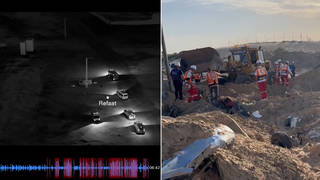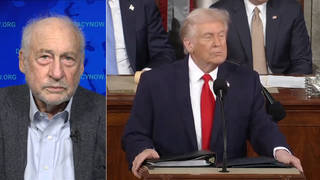
“We’re at a moment of immense danger,” warns HuffPost correspondent Akbar Shahid Ahmed, as the Trump administration appears increasingly amenable to escalating conflict with Iran. Ahmed shares what we know about the U.S. military buildup and the “magical thinking” of regime change rhetoric among Washington, D.C., policymakers that could turn into a “hugely devastating” war with Iran. Above all, says Ahmed, Trump’s boasts about being an antiwar leader have not come true: “We haven’t seen him solve any of the wars that he said he would address.”
Transcript
JUAN GONZÁLEZ: Yeah, I’d like to bring in Akbar Shahid Ahmed, senior diplomatic correspondent for HuffPost. Akbar, your reaction to the events of the last couple of days in this Israeli attack on Iran?
AKBAR SHAHID AHMED: I think, Juan, we’re seeing a really tremendous risk, as Professor Marandi is saying, of the U.S. being pulled in. And we have to remember that in addition to the bases, the U.S. partners, United Arab Emirates, Qatar, Bahrain, which are all major energy exporters, maybe not to the U.S., but to the global economy, to Europe, to China, to Asia — beyond that, there are 40,000 U.S. troops — right? — many of them in Iraq, many across the region. Donald Trump, while saying that he was a “peace through strength,” antiwar president, we haven’t seen him solve any of the wars that he said he would address — Ukraine, Gaza. In fact, now there’s a new war unfolding on his watch. And he hasn’t brought back any of these military deployments.
What this tells us, really, is that because he’s, A, kind of crippled the federal government, he’s undermined the State Department, there’s chaos at the top ranks of the Pentagon, there isn’t even capacity in the Trump administration to deescalate at this point, and, B, Trump didn’t really have a clear strategic doctrine, right? For Israeli Prime Minister Benjamin Netanyahu, the goal of an attack on Iran, and, frankly, a joint U.S.-Israeli attack on Iran, that’s been a long-standing goal. He’s wanted that for decades. Netanyahu, through the Biden administration, before Trump entered office, was able to amass more and more American support. And I think he looked at this and said, “This is my moment. Trump can’t stop me. I’ve had a clear goal.”
And so, I think that’s where we’re at a moment of immense danger. The only kind of restraining, deescalatory force could really be the U.S. You have regional governments, Saudi Arabia among them, the Qataris, Oman, which has hosted talks between the U.S. and Iran. All these regional governments are trying to deescalate. But what I hear from Arab diplomats is, while the Trump administration is issuing statements to them, even behind the scenes saying, “No, no, don’t worry. We’re not going to get the U.S. involved,” there’s a clear gap between that rhetoric, which matches Trump’s, again, “peace through strength,” antiwar claims, and Trump’s actual actions, which are indicating a very clear U.S. military buildup and an increasing likelihood of a hugely devastating U.S. war with Iran.
AMY GOODMAN: Akbar, if you can talk about this latest piece, “Israel’s War on Iran” — the latest piece that you wrote on who has got Trump’s ear?
AKBAR SHAHID AHMED: Mm-hmm. Yeah, Amy, it’s really interesting, right? This is a team where the president has made personal fealty, personal loyalty, the main qualifying factor, right? You’ve seen him reject intelligence saying that Iran was not rushing towards a nuclear weapon. You’ve seen him devastate the State Department. You’ve seen him fire top military commanders, which means that the people around him are either really cowed or very weak, or thinking about their own careers.
Into that gap, the person that steps in, and who I highlighted in this recent piece, is someone called Erik Kurilla. That’s the top U.S. military commander in the Middle East. He’s a four-star Army general. He’s been in his position since 2022. And what was striking as I got to understand Kurilla’s deep influence over Trump was a couple of things. He’s — even by the standards of American officials, who work really closely with Israeli counterparts all the time, Kurilla is seen as extremely close. One former U.S. official told me, in internal deliberations, Kurilla often seemed to know what the Israelis were thinking and what intelligence they had before any other person in the American government. So, there’s that level of familiarity. He was in position under Biden, which was a period during which he worked really closely with the Israelis in the wars in Gaza, in Lebanon, and in Israel’s defense — right? — against Iranian barrages, which it did face in 2024. In that period, he began kind of joint planning with the Israelis for a U.S.-Israeli strike. And now it looks like the moment is ripe.
And there’s another just confluence of factors that increase the danger here. Kurilla is looking at his retirement date in the coming months, maybe even as soon as July. And the chatter among American and Israeli officials for a while has been, “We want to get this joint U.S.-Israeli campaign against Iran done while Kurilla is in office.”
So, all these factors have come together, and we have to remember that’s happening under, again, a President Donald Trump, who, as one expert told me, looks at stars and badges, and he can’t say “no,” right? He hero worships the military. He sees it as a kind of expression of masculinity, of strength, of all these dynamics he’s obsessed with. So, is Donald Trump really going to tell a general, even one who, you know, necessarily — Kurilla is not necessarily — Tucker Carlson has talked about warmongers. I think Kurilla and other military leaders would say, “We’re very much thinking about the U.S.’s best interests.” But military leaders are battlefield leaders. They are not necessarily strategists for long-term stability, nor are they politicians who can win public support. When the American public has shown they are very war-weary, and when it’s not clear how a U.S.-Israeli strike would lead to a better strategic, long-term picture, instead of unpredictable chaos and violence, do we really want a military leader to be the most influential voice in Trump’s ear? That’s where we are right now with General Kurilla.
JUAN GONZÁLEZ: And, Akbar, I wanted to ask you — the Israeli government officials have kept claiming that they’re not interested in regime change in Iran, but yet this week The Jerusalem Post has an article about the eldest son of the late shah of Iran, Reza Pahlavi, talking about how he has a 100-day transition plan for — and that he will soon be back in Iran. Your thoughts on how — the impact of this kind of news on the Iranian people?
AKBAR SHAHID AHMED: It’s impossible to separate headlines like that from the last 22 years of U.S. foreign policy in the region, right? People hear that, and they think about regime change in Iraq, which led to chaos and the rise of ISIS. They hear that, they think about Libya, which, again, chaotic, a horrible human trafficking situation. So, I think the way that this is resonating for Iranians, I imagine, and also certainly for Americans and audiences around the world, is this is just so fantastical, right?
And Israeli officials, to your point, have said two things at once. They have said, “We’re not pursuing regime change. Our goal is to limit Iran’s nuclear development.” But we’ve also seen Israeli officials across the board — importantly, not just Netanyahu, but the leading opposition figures, political rivals of Netanyahu, really senior Israeli political figures — have come out and said, “You know, we’re not necessarily doing regime change, but, Iranian people, don’t you think this is a great time to have a revolution,” you know? And I think that kind of — there’s a lot in there that’s concerning, right? I think for Iranian activists who have been raising their voices and been really viciously repressed for it, they feel that their message, their calls for reform are being hijacked, in a way, by Netanyahu, who is deeply unpopular there. And I just say it’s very unlikely to work, right? There is not a — there’s not an indication throughout history, and certainly not in recent Middle Eastern history, that suggests local communities under bombing are going to say, “Absolutely, the people bombing us are the liberators. This is who we want to stand with.”
With regard to Reza Pahlavi and this idea of restoring the monarchy in Iran, the degree — you know, Pahlavi lives here in D.C. He’s very much a fixture in kind of hawkish circles, close to people here. But the kind of magical thinking that you’re seeing among D.C. policymakers, where they believe that someone who’s been out of Iran since 1979 is going to go in and understand the modern country, where most people are young, where most people have not ever lived under the shah, it’s just remarkable and stunning, right?
And you mentioned earlier in the show these congressional efforts that Senator Kaine is leading, some legislators in the House are leading, and I do think there’s a significant number of Democrats who are willing to stand up and question whether another clear attempt at regime change, or certainly a risk of mission creep, is worth it. But you aren’t seeing Republicans sign on. Only one Republican member of Congress so far has joined those resolutions. And that tells us a lot about the disconnect between the, really, again, magical thinking, hawkish thinking in decision-making and policy circles here in Washington and people in America, people in Iran, people around the world.
AMY GOODMAN: Akbar Shahid Ahmed, we want to thank you for being with us, senior diplomatic correspondent for HuffPost. His recent pieces, we’ll link to at democracynow.org, “Israel’s War on Iran Bears the Echo of Past American Mistakes” and “The Pro-Israel U.S. General Quietly Influencing Trump on Iran,” speaking to us from D.C. Mohammad Marandi, thank you, as well, professor of English literature and Orientalism at the University of Tehran, part of the nuclear deal negotiations of 2015.
When we come back, what’s happening in Gaza as the world’s attention turns to Iran? Then we’ll be joined by New York City Comptroller Brad Lander, arrested by ICE yesterday as he tried to protect an immigrant in court. Stay with us.
[break]
AMY GOODMAN: [“Chardi Kala”] by Sonny Singh, performing in our Democracy Now! studio yesterday.











Media Options